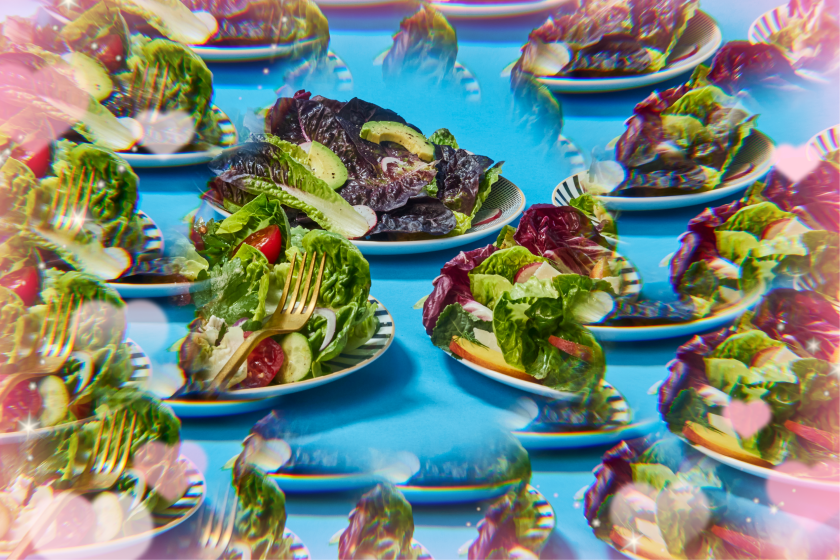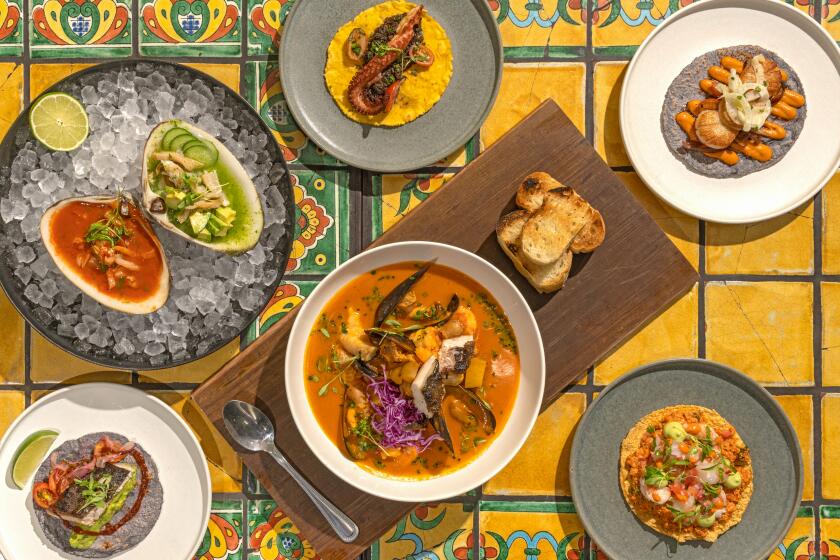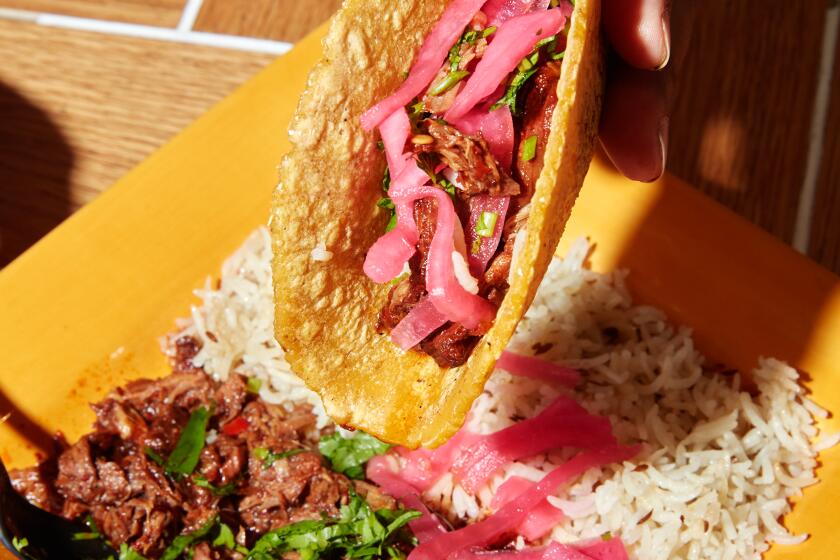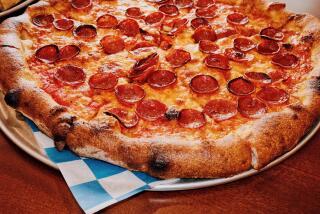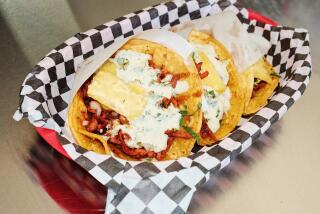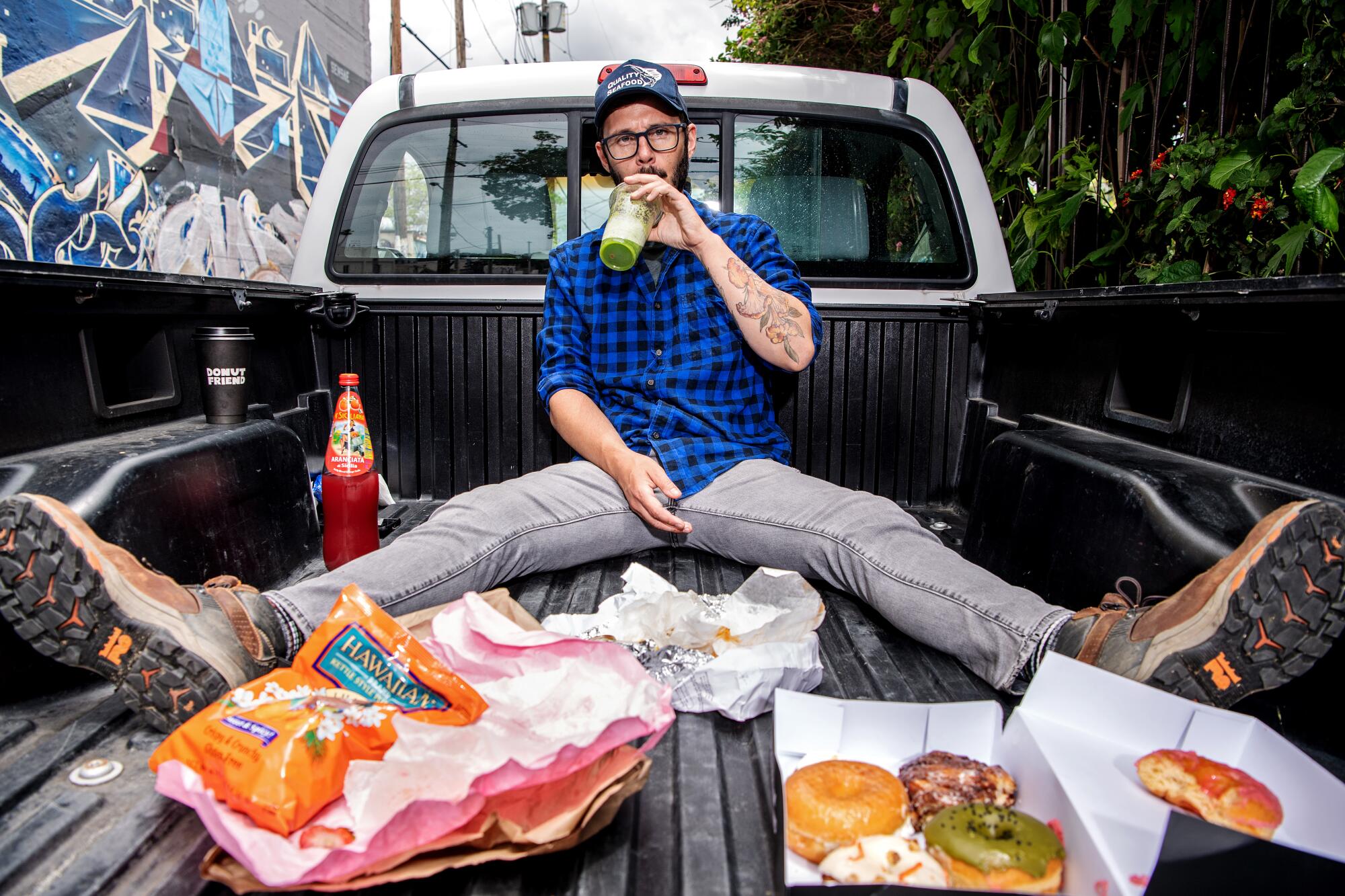
In Los Angeles, your vehicle isn’t merely transportation, but a mobile dining room meant to lug around this bounteous city.
I’ve never been one to get sentimental over a vehicle, but saying goodbye to my dad’s 2006 midlife-crisis white Dodge Charger a few months back got me teary.
Two years ago I inherited the car and drove it from western Pennsylvania to Los Angeles on a solo, cross-country food tour. I ate Indi’s fried chicken in the driver’s seat in Louisville, Ky., and pulled a muffuletta from the glovebox when hunger pangs hit between New Orleans and Austin, Texas. I stashed greasy pork cracklins in the front console leaving Lafayette, Ark., buckled El Paso Tex-Mex safely in the passenger seat, and discovered the wonderful joys of eating fried catfish, tacos, brisket, beignets, queso, pizza, corn dogs, fried tomato sandwiches and nopales all using the sturdy trunk like a high top.
But too many winters of salted, snowy Pennsylvania roads rusted the brake lines irreparably, so I needed a new car. And, friend, I hate looking for a new car.
Caesar, Greek, chopped, Cobb: Los Angeles has a lot of salad chains. Here’s a guide to help you navigate them.
I reckon I’m downright awful at selecting an automobile that speaks to my person. I’ve driven that Charger and a Subaru, each of which would regularly prompt bad jokes about owner stereotypes (“What are you, a cop?” was one). Years of seemingly driving the wrong vehicle have since raised a principal internal investigation — what am I exactly?
I’m a food writer living in Los Angeles, so I decided to buy a pickup truck.
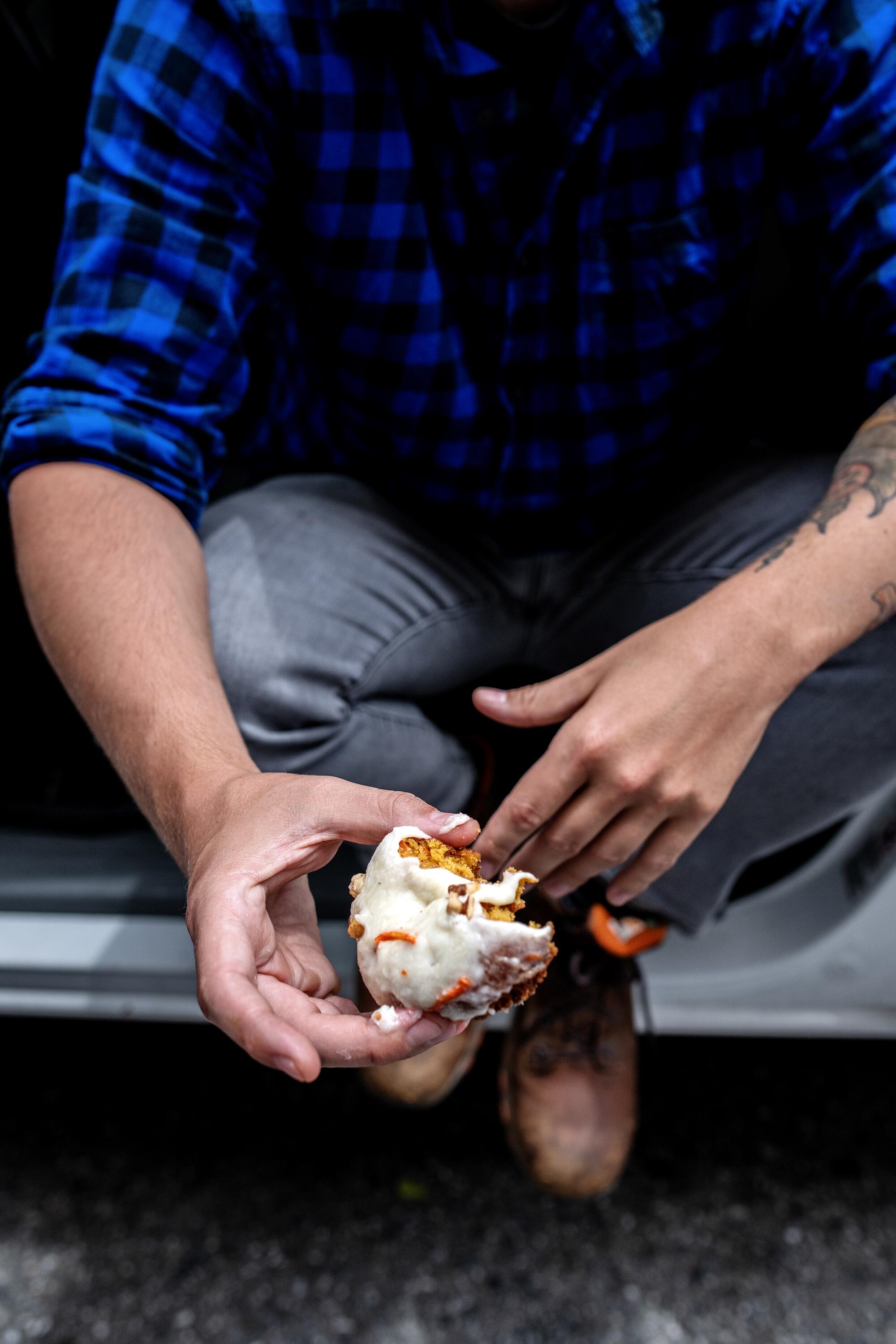
Despite every effort to boost usage of the Metro system, and even with improvements in bicycle infrastructure, Los Angeles is terminally a driving culture. And by proxy, an eating and driving culture. As Jonathan Gold said in the 2015 documentary “City of Gold,” “I’m an L.A. guy. I drive. I am my truck. My truck is me.”
The pickup truck is perfect for those who trust that their vehicle isn’t merely transportation but a mobile dining room meant to lug around this bounteous city. Trucks, and the people eating in them, thrive throughout Los Angeles, particularly in parking lots near taquerías.
At Leo’s Tacos Truck at Western and Sunset, Anthony Lopez, 22, and Yenifer Ceron, 23, sit spread out in the back of a tan 2020 Toyota Tacoma TRD Sport around dinnertime. Lopez sits halfway up the truck bed, his back resting on the wheel well and his feet comfortably stretched across to the other side. Ceron sits with her legs crisscrossed on the gate. Between them is an onslaught of sopes, salsas, radishes, limes and grilled peppers.
Why we chose the newly expanded mariscos stand in Historic South-Central’s Mercado la Paloma as our Restaurant of the Year.
“It’s like your own private section. It’s more intimate. Romantic,” Ceron says as she nods over to Lopez, who grins shyly. I point out that there are plenty of foldable tables and chairs next to Leo’s, but Lopez is fine without them. “It’s comfortable. It’s like being at home,” he says.
Some foods, like French fries, are inarguably best consumed in a vehicle.
There are nearly 10 million people living in Los Angeles County. As of 2021, the California Department of Motor Vehicles lists 6,386,830 registered vehicles, with seemingly all of them stuck on the 5 (Bing! How’s everybody doing tonight?).
And according to the Southern California Assn. of Governments, “The average L.A. driver now loses over 100 hours every year stuck in traffic.” Pretty bleak wording for a government website. If I’m going to be trapped in a vehicle for 100 hours every year, it’s going to be a vehicle that I want to be in. It’s going to be a truck, and I’m going to be eating in it.
Four life stories, two pop-ups, and regional Mexican and Indian flavors unite deliciously at this new taqueria on 3rd Street in Los Angeles.
My truck is the thing I eat most in, on, near, beside and with; I spend enough time dining with it to consider it a close friend. When there are no empty chairs at the pupuseria, when I don’t feel like sitting at a wobbly table that prohibits elbows, when I want to stand and blather with friends outside while waving around a burrito for emphaticness — the truck fulfills and accomplishes in ways traditional dining accommodations simply cannot. In fact, when asked if I prefer indoor or outdoor seating, I choose truck.
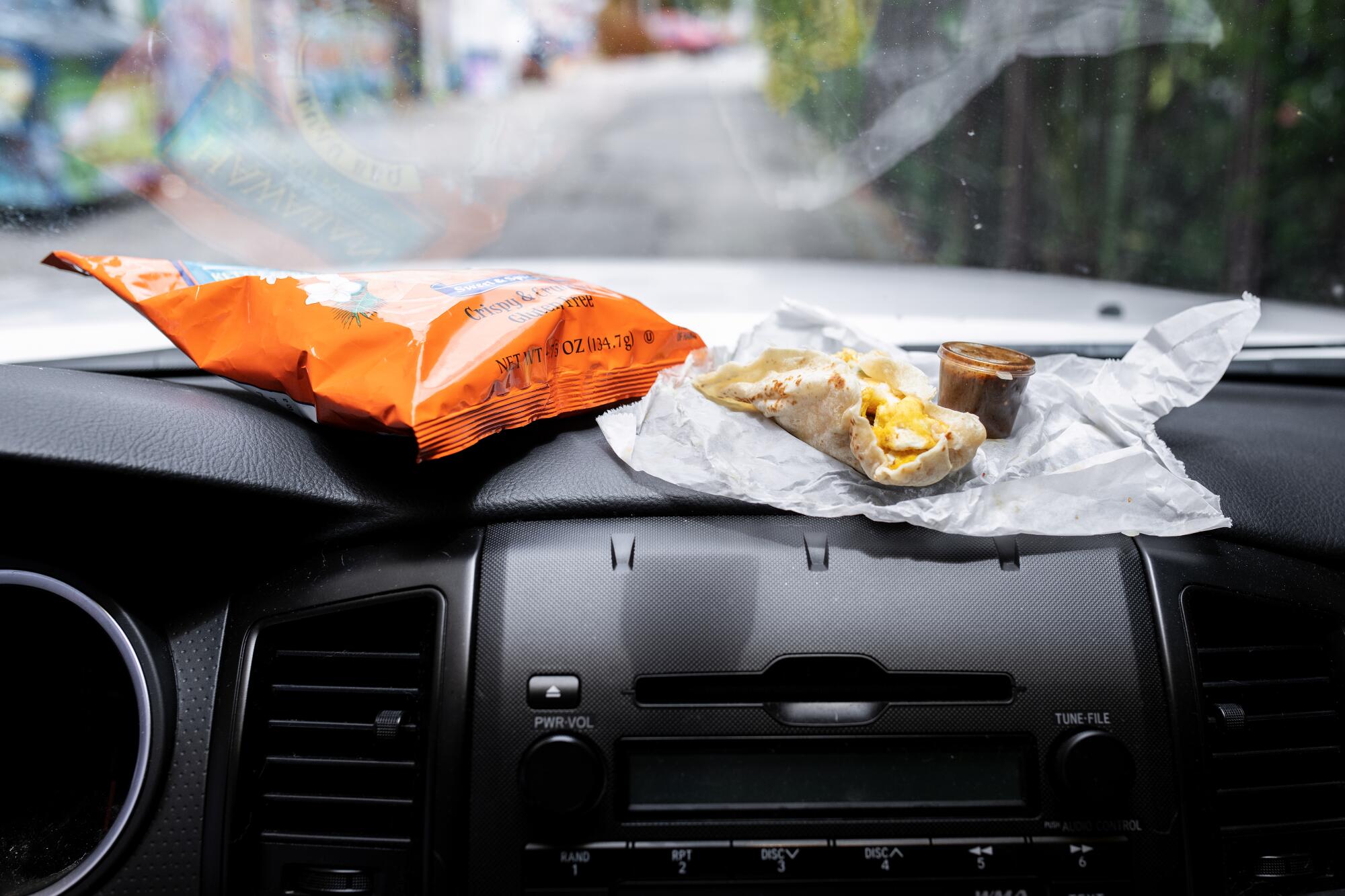
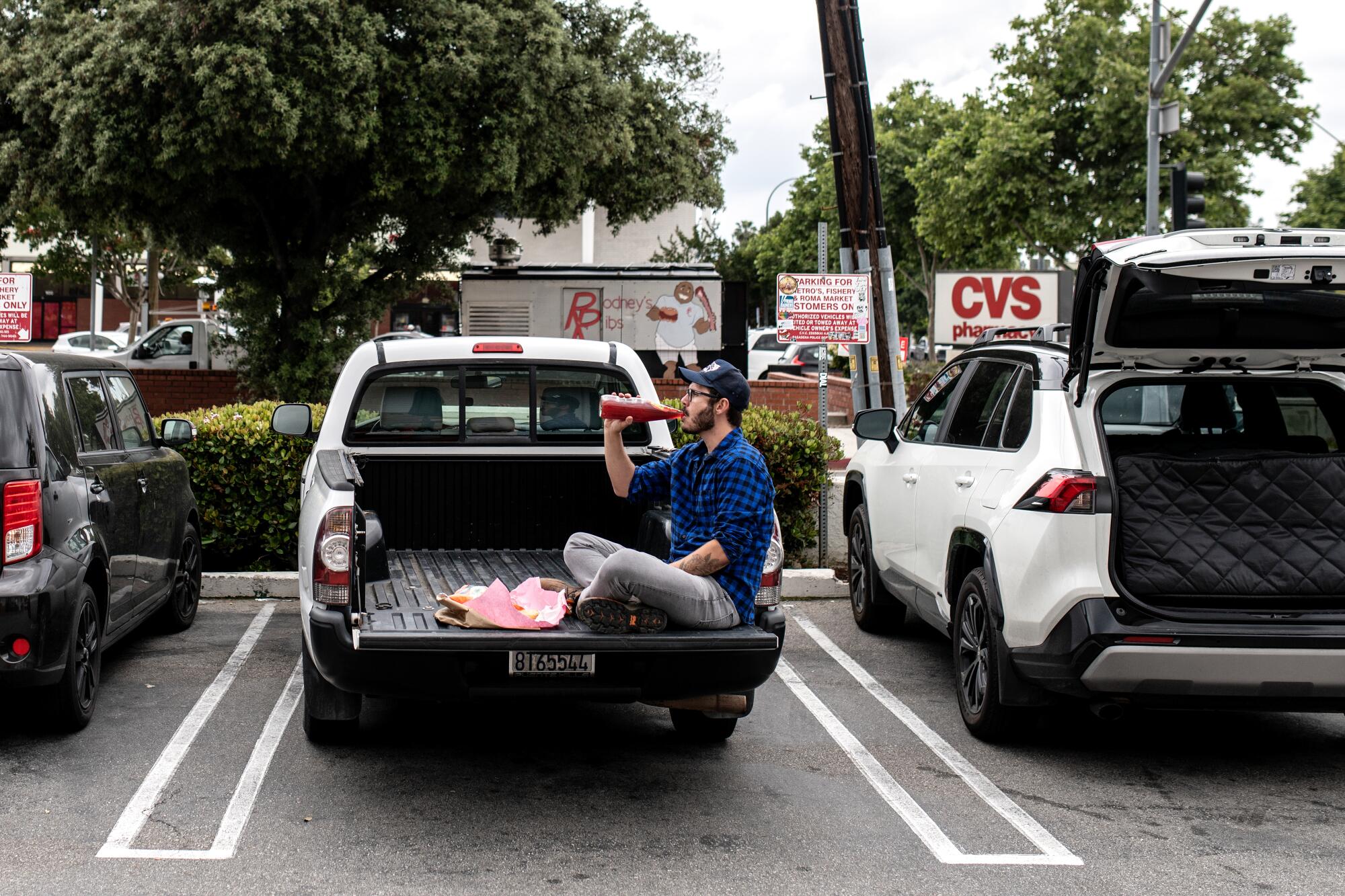
In Los Angeles, a pickup truck reaches peak convenience at places where there’s simply no seating, like Roma Market in Altadena. I often pull my Tacoma up to the idealized Italian deli on a Saturday morning for a sandwich, a bag of Tim’s jalapeño chips and a blood orange soda. A lesser-known secret about Roma is that on Saturdays it also has fried cannoli, which you’ll find scattered across the grocer’s wide refrigerated section like Easter eggs.
Using the back gate of my Toyota like a TV dinner tray, the sandwich, chips, soda and cannoli fit spaciously. It should also be noted that this specific experience at Roma Market — sitting outside on the edge of a vehicle with an arrangement of deli treats — is one of the more perfect morning-after dates in Los Angeles. And if alone, the neat sandwich in its cozy pink paper wrapper is exemplary hand-held food for driving across the 134, though the flakes of Sicilian bread rain down on my pants like carbohydrate confetti.
There are those who rebuff eating and driving as a messy and improper compulsion, but I don’t believe those people have experienced the pure joy of eating an original Fatburger behind the wheel of a car with expired tags or speedily finishing the flaky and tart erbazzone from Ceci’s Gastronomia while merging lanes on Sunset.
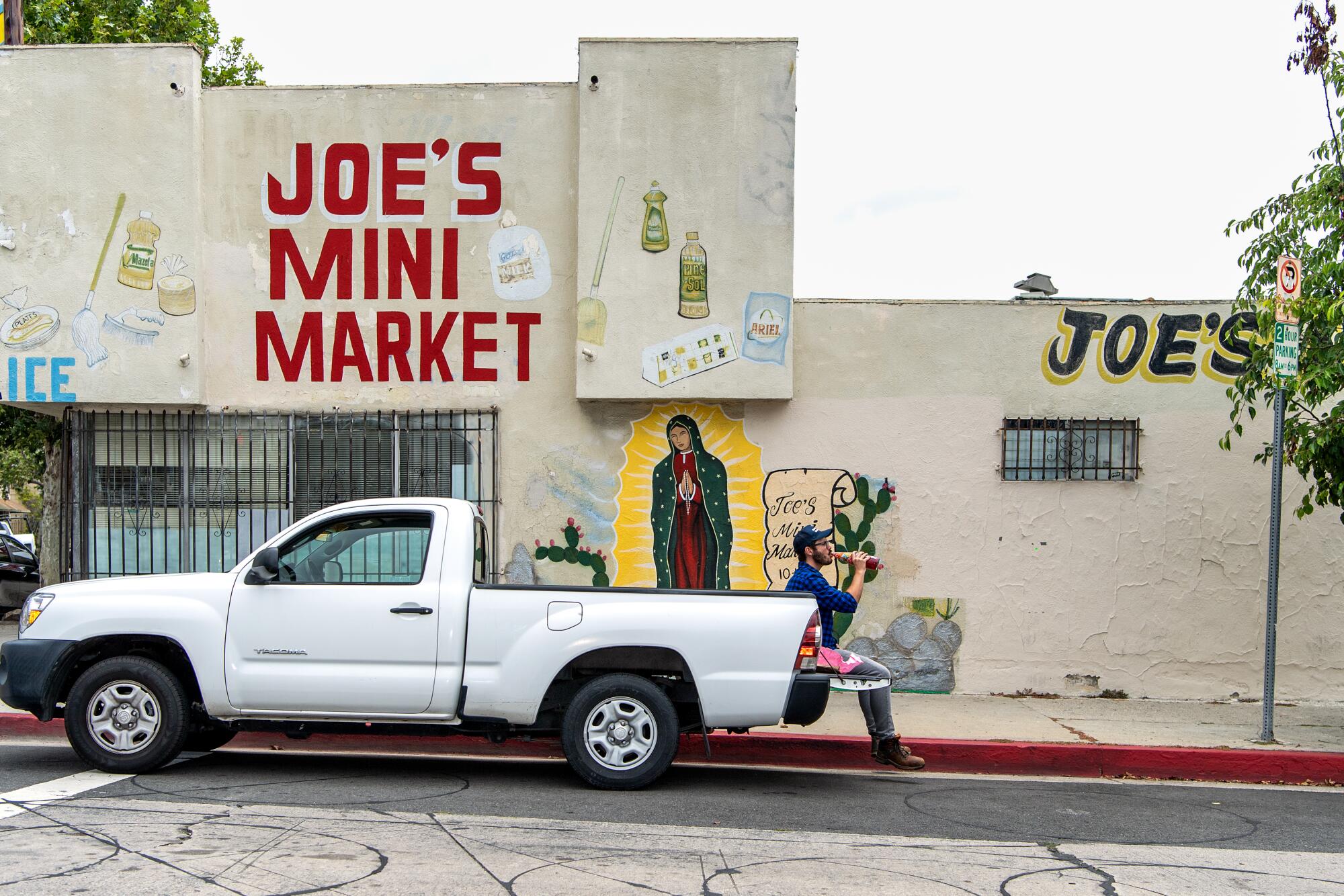
When I see a fellow motorist chowing down behind the wheel, I nod in solidarity. “We’re the same,” I mutter to a stranger biting into a jelly doughnut at a red light.
In a single day, I have seen a guy eating a breakfast banana in his Ford leaving the Fern Dell entrance of Griffith Park, a woman in a parked Civic eating a full burrito for lunch near South Pasadena and a blurred stranger speeding down the 101 in a banged-up Corolla hastily chomping into a sandwich. I have also glimpsed a few others reaching into their front console to pull out a couple of fast food fries before they go cold and soggy — a pro move if there ever was one.
I don’t schlep lumber or tow concrete; my cargo is pastrami, chili cheese fries, burgers and banh mi.
Some foods, like French fries, are inarguably best consumed in a vehicle. A cohesive, glued together smashburger is also perfect driving food as opposed to its floppier, thick-burger counterpart. And though tacos are nearly impossible to fully enjoy behind the wheel (imagine squeezing a lime while driving), a tightly wrapped breakfast burrito with a napkin on your lap isn’t the most reckless thing in the world.
Salads are decidedly not truck (though your vehicle should have disposable utensils at all times), and ice cream cones are a high-wire act best left to the outdoors. Although I recently put a Butterfinger Twister from Fosters Freeze directly into my cup holder, taking spoonfuls of crunchy, candied soft serve at every stop, excitedly looking forward to traffic jams and red lights to sneak in a bite.
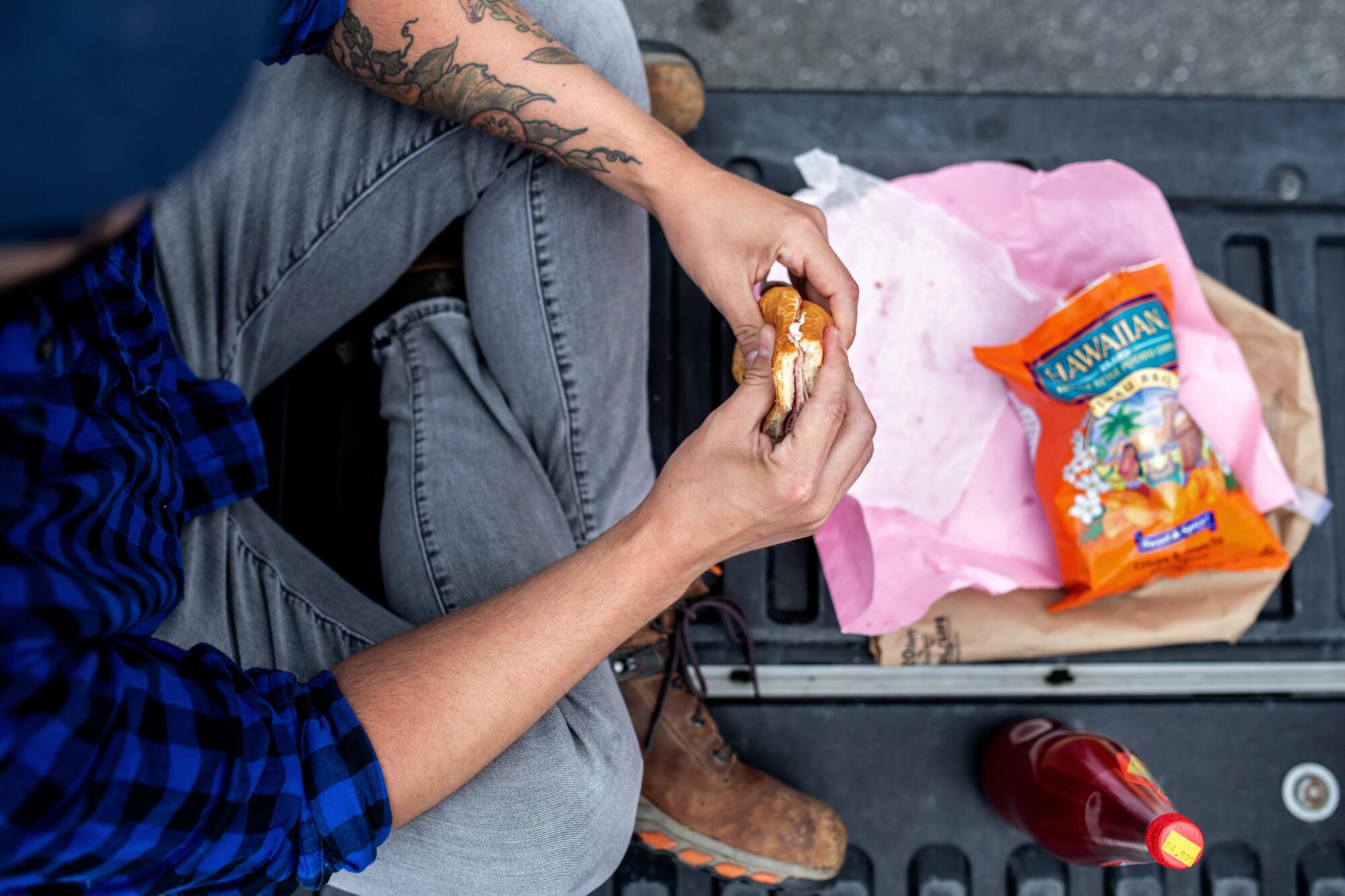
In Los Angeles, you cannot separate your car from your person, which is why I finally bought a vehicle that I’ve always thought would best represent my character — I wanted to feel whole in a city that isn’t mine.
My 2009 four-cylinder, two-door, white Toyota Tacoma isn’t unique. It’s not vintage or chic. It’s utilitarian. Ubiquitous in Los Angeles. The pickup truck, in L.A., is the working-class vehicle of necessity. Of the many people I spoke to eating in trucks across various parking lots in L.A., a lot of them worked in construction or landscaping, an integral part of the fabric of the city.
Currently, there are two other white Toyota Tacomas parked on Loma Linda Avenue in Thai Town. One of them is full of scrap metal, the other is stocked with pool cleaning equipment and barrels of substances, one with the word “calcium” written crookedly in marker.
I don’t haul calcium. My Tacoma is mostly empty, save for an empty bottle of tamarind Jarritos that I forget is there until I hear it clanging around the truck bed as I drive down Los Feliz Boulevard in the morning. I don’t schlep lumber or tow concrete; my cargo is pastrami, chili cheese fries, burgers and banh mi.
As an L.A. transplant, I will tell you that one of the first things I was struck by is the communal power of a pickup truck here. A truck calls people to hang, and hang hard. All across the city, I notice that people socialize, loiter, consort, mingle, hover and post up near trucks.
Outside of taco stands, near burger joints, parked in yellow zones at sandwich shops — the truck is simply a water cooler filled with motor oil. To finish up a pickup softball game in the early days of summer and retreat to the back end of a truck to drink a few beers with friends is decidedly American, but given the weather here, maybe more so Californian.
Over at Angel’s Tijuana Tacos in Eagle Rock, I catch up with Matthew Bockal, 40, who half-sits casually on the bed of his 2001 Tacoma, ready to devour a chicken quesadilla and a tall Coke. Bockal works as a camera assistant, and he came to Angel’s right after work. “It’s just a perfect table,” he says as the sun illuminates his weathered vehicle, “and it’s beautiful out. Food tastes better outside.”
Bockal tells me that his truck has 301,000 miles on it. He pauses for a second, then laments, “My girlfriend hates it.”
I bought this truck to eat through Los Angeles. But, more important, I bought it for you, reader. My truck is an open invitation to make an unrestrained, hospitable mess. Bring your muddy shoes, your sand, your wet dog. By all means, eat a hamburger in there. Unfurl the light foil wrapper, let the smell of the steamed bun permanently infiltrate the cushioned seats.
Smoke a cigarette, take your shoes off, listen to whatever you want. Food and vehicles are two things that I have found are best shared, and shared messily.
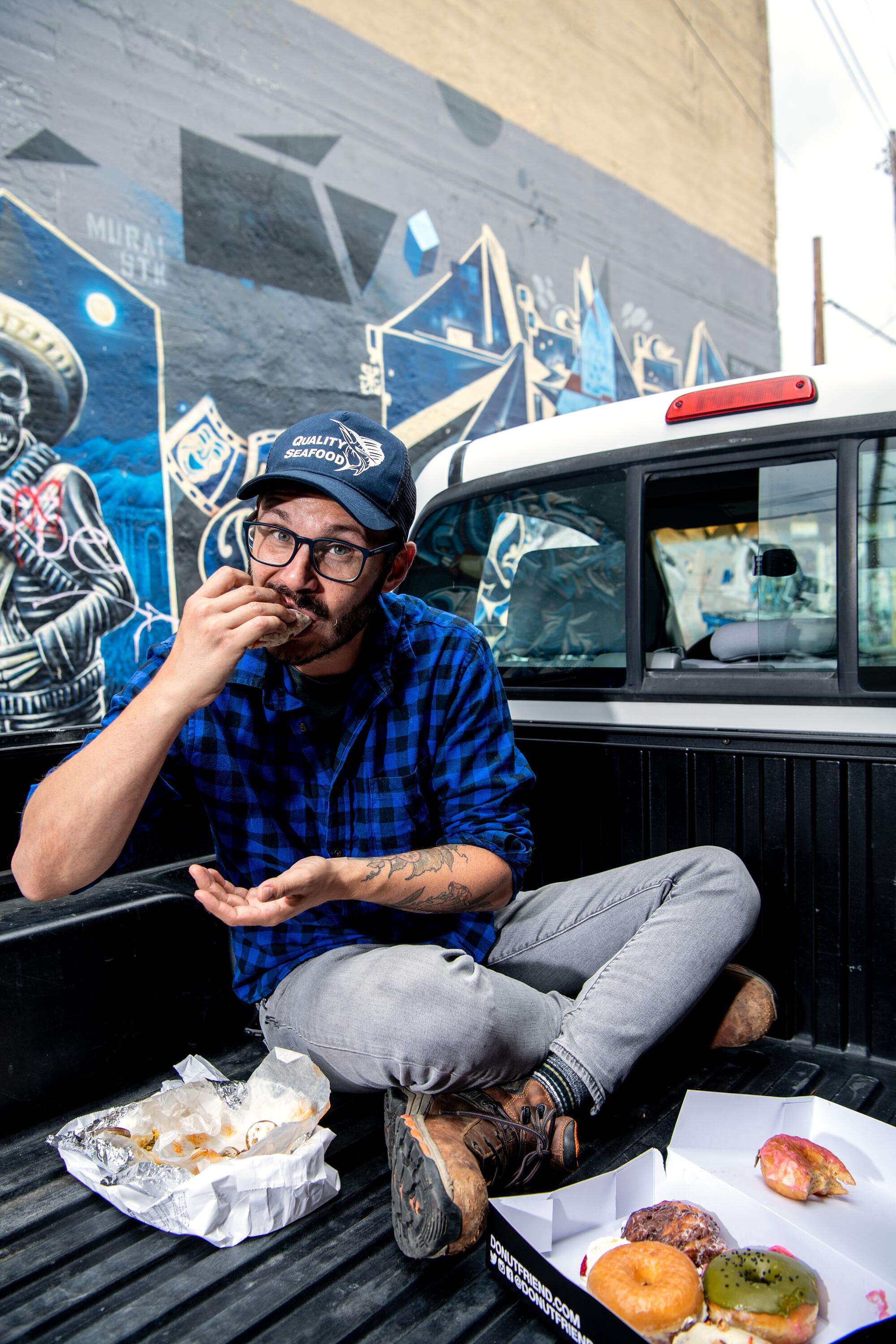
Danny Palumbo is a writer and cook living in Los Angeles. He most recently wrote “Come for the halo-halo, stay for the ha-ha-ha” for The Times.
More to Read
Eat your way across L.A.
Get our weekly Tasting Notes newsletter for reviews, news and more.
You may occasionally receive promotional content from the Los Angeles Times.
